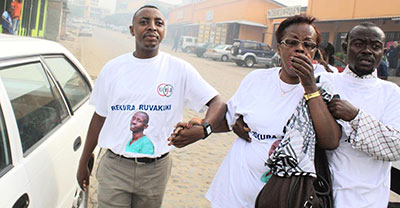On Tuesday, Burundi’s press corps did what it has done for the past three weeks: protest the imprisonment of one of its own. Hassan Ruvakuki is a reporter jailed since November 28, 2011 on anti-state charges; for the first time, the journalists wore white t-shirts showing Ruvakuki in his green prison uniform. But this time, the reaction by police caught journalists by surprise.
“We were walking peacefully towards the Justice Ministry, a march that we stage every Tuesday to demand the release of our colleague Hassan Ruvakuki,” said Antoine Kaburahe, editor of the independent weekly Iwacu, in an interview in his newspaper after the march. “To date, the march was taking place without incident, with the escort of police.”
However, on Tuesday, police in the capital Bujumbura blocked the journalists before they could reach the ministry, said Patrick Nduwimana, the interim director of Bonesha FM, a station for which Ruvakuki also works. “When they blocked our path, we just turned around, peacefully, to return to our respective newsrooms, but they even stopped us from doing this.” Nduwimana told me the police fired teargas and beat journalists with the butts of their guns. “They ran behind the journalists, some fell to the ground and the police hit angrily on men and women on the street,” Kaburahe later told Iwacu. Fortunately, there were no serious injuries and no arrests, Nduwimana said. Police detained Innocent Muhoze, the director of private broadcaster Radio-Télé Renaissance, for a few minutes, but released him without charge, local journalists said.
The police later claimed that the march was an illegal demonstration, according to local journalists and international wire reports. Alexandre Niyungeko, a press union leader, rejected the claim, pointing out that Burundi’s constitution guarantees citizens freedom of expression and assembly. “As long as we inform authorities, which we did, there is nothing illegal about these demonstrations,” Nduwimana said.
The weekly protests by journalists began in mid-January following the January 8 decision by an appeals court to reduce Ruvakuki’s sentence from life imprisonment to three years for “working with a criminal group.” Ruvakuki was arrested after interviewing the leader of a self-proclaimed new rebel group in November 2011 at a time when the government had denied the existence of the group, local journalists said. Journalists who attended the trial told me government prosecutors failed to produce convincing evidence to back up the charge. RFI reported that Ruvakuki’s lawyer, Fabien Segatwa, was preparing to plead with the justice minister for a pardon for his client.
Now relations between the media and police may well deteriorate, Kaburahe said. “What scared me the most is the hatred that we read in the eyes of the police. As if we were criminals. It’s a shame because there was a peaceful atmosphere.” According to Nduwimana, the police may have been unnerved by the t-shirts the journalists wore showing Ruvakuki in his prison uniform.
The protesters plan to convene on Thursday to debate whether to continue the weekly protests in light of the police attack. Most journalists I spoke to were keen to continue despite the risks. “Consultations are ongoing. What is sure, though, next Tuesday there will be a big event, many journalists will be at the rendezvous,” Kaburahe said. “What will the police do next Tuesday? I do not know…”
